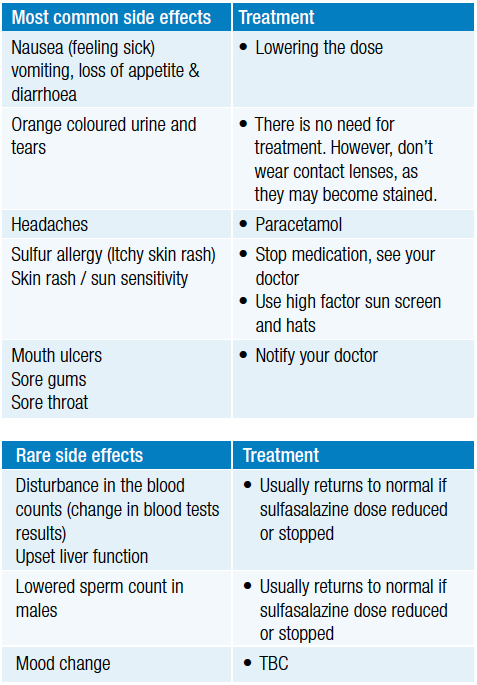Sulfasalazine (children)
What is it?
Sulfasalazine is a medication used to treat certain childhood rheumatic conditions (diseases which may affect joints, muscles, skin or eyes). This can include juvenile arthritis (JIA) and inflammatory bowel disease.
It is a medication that works by suppressing your immune system. It reduces the damage done by inflammation, rather than just reducing pain. Because of this, it is called a disease modifying antirheumatic drug (DMARD). Other medications in this group include leflunomide, methotrexate and hydroxychloroquine.
How will it help?
Sulfasalazine is a medicine that works slowly. You can expect your child to gradually start feeling better, but it might take two to three months.
How is sulfasalazine given?
Sulfasalazine can be given as a tablet. There are two types of tablet: plain and enteric coated. The enteric coated should not be crushed, because they have a special coating which makes them more gentle on the stomach.
What is the dose, and how often is it given?
Treatment starts slowly: usually one tablet a day. This is increased over a few weeks. The dose is adjusted to your child’s weight.
How long will it be used for?
Sulfasalazine can be continued long-term to maintain disease control.
Are there any side effects?
Sulfasalazine is usually very effective at improving your child’s condition but, as with all medicines, side effects can occur. Some are common, and some are rare. Most people don’t have any problems when they take sulfasalazine.

Things you need to know when taking this medicine
All children taking sulfasalazine should be seen regularly by their paediatric rheumatologist to help monitor their health and minimise side effects.
What to do if your child is sick
It is safe to give sulfasalazine even if your child is sick with a cold or cough. Don’t give sulfasalazine if your child
- Has had vomiting/diarrhoea
- Is sick and you’re not sure why
If you’re not sure, talk to your doctor, and get them checked, if necessary, before giving the sulfasalazine.
Interactions
Sulfasalazine can interact with other medicines. Talk to your doctor before taking any prescription medicines, natural medicines and medicines that you can buy over the counter.
Immunisations
Sulfalasazine is safe with all immunisations. Children should follow the standard immunisation schedule.
Infections
There is no increased risk of infections on sulfasalazine.
Alcohol
Sulfasalazine and alcohol are both broken down by the liver. Drinking alcohol while you are on sulfasalazine can put extra strain on the liver. It is not known how much is safe, so we suggest that anyone on sulfasalazine should avoid drinking alcohol.
Sexual Health
Sulfasalazine has been safely used in women who are pregnant and breastfeeding. Having been on sulfasalazine in the past does not change the chances of having babies later. Sulfasalazine can decrease the sperm counts in males, but this usually goes back to normal once the medicine is stopped.
Myths and misconceptions
You may hear a lot of different information about sulfasalazine from friends, pharmacists or people you know. If you are worried about anything, please talk to your doctor or nurse for more information. If your child is taking sulfasalazine you should see your paediatric rheumatologist regularly to make sure the treatment is working and to minimise any possible side effects.
Things to remember
- You must see your rheumatologist regularly to make sure the treatment is working and check for possible side effects.
- You should have regular blood tests as suggested by your rheumatologist.
- If you are worried about any side effects, you should contact your rheumatologist as soon as possible.
- If you stop sulfasalazine for any reason, you must contact your rheumatologist.
This medicine should be kept in a safe place, as accidental overdose can be serious.
For further information see Sulfasalazine printable information sheet_Paediatric
This Information Sheet has been prepared using materials obtained from various sources which have been reviewed by the Australian Rheumatology Association (ARA). It contains general information only and does not contain a complete or definitive statement of all possible uses, actions, precautions, side effects or interactions of the medicines referenced. This information is not intended as medical advice for individual conditions nor for making an individual assessment of the risks and benefits of taking a particular medicine. Decisions regarding the assessment and treatment of patients are the sole responsibility of the treating medical professional, exercising their own clinical judgment and taking into account all of the circumstances and the medical history of the individual patient. ARA has used all reasonable endeavours to ensure the information on which this Information Sheet is based is accurate and up to date. However, the ARA accepts no responsibility or liability for the accuracy, currency, reliability and/or completeness of the information contained in this Information Sheet. To the maximum extent permitted by law, the ARA expressly disclaims any liability for any injury, loss, harm or damage arising from or in connection with use of and reliance on the information contained in this Information Sheet. This information sheet is copyright and may be reproduced in its entirety but may not be altered without prior written permission from the ARA. Page updated April 2024Discover more...
-
Programs & Research
Arthritis Australia funds research and advocates to improve care, management, support and quality-of-life for people with arthritis.
-
10 steps for living well with arthritis
Here is our 10 steps checklist to help you live with arthritis.
-
Children and arthritis
Arthritis can happen at any age. Here, you can find management and treatment information specifically created for the more than 6,000 Australian children living with...
Sign up to Arthritis Insights
Regular updates, news and research findings delivered to your inbox: